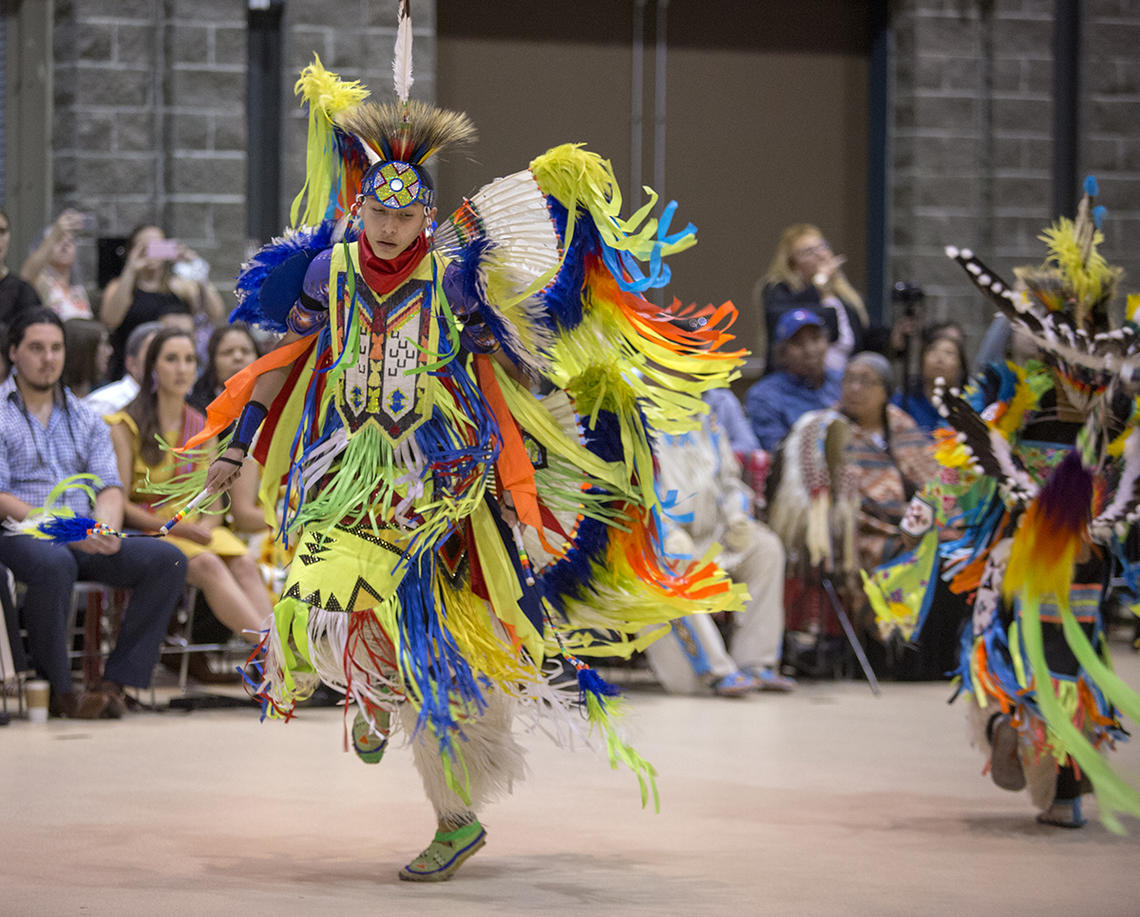Aug. 8, 2018
How to attend a powwow, in a good way

A fancy dance performer at UCalgary's Indigenous Graduation Powwow on June 2, 2018.
Colleen De Neve, for the University of Calgary
June to September is powwow season on reserves across the country, and in Calgary, large numbers of non-Indigenous people have had a taste of the powwow experience, most notably at the Canada Day events hosted at Prince's Island Park.
In a recent interview with the Calgary Alliance for the Common Good, Pamela Beebe, community leader, and UCalgary’s Indigenous cultural education and protocol specialist, shares some of her thoughts for newcomers to Indigenous events.
"Absolutely, we want you to enjoy our culture and love our culture like we do," Beebe says. "Obviously some people love it so much that they've become part of it." But she has a few things to say to people who were not at that point. The core of her advice? To be respectful — perhaps more respectful than is the case right now.
For Beebe, there are two main areas of concern. The first relates to drums and drummers. "The drum is difficult to make, costly to repair and replace," she says. "They're usually passed down in families. So [a drum] is very, very precious to the person who owns it."
That’s why chairs are set up in a circle around it — not just for the drummers to sit on, but to protect the drum itself. "Drummers can't be there all the time — they may have other things to do," she says. "But everyone at a powwow knows that's their space, so you shouldn’t go near it at all … Don't go between the chair and the drum, or touch the drum in any way. You just don't, ever."
Respect for spectator space and the way it is organized, is another concern. Beebe describes what happens at a traditional powwow, where people arrive early and bring chairs to reserve space. It’s disrespectful for latecomers to move in and block their view. Space is also left between rows of chairs to allow dancers to walk through. “We do it naturally, in the powwow circle,” she says. “People know — 10 chairs, and a space, 10 chairs, and a space, but at events like those at Prince’s Island, no one thinks of leaving space."
Along with respect for dancers’ space, people should also show respect by not taking pictures of them without asking permission first. Her final admonition? “Don’t be on your phone the whole time!” The whole point, she says, is to leave all those media connections behind. Instead, come early, bring chairs, and a cooler for food and drink, a blanket to have handy when the evening cools down — and enjoy what is happening in the moment.

A drum group performs at UCalgary's Indigenous Graduation Powwow on June 2, 2018.
Colleen De Neve, for the University of Calgary
That’s what happens in Beebe’s family. She comes as a spectator, but one with work to do. She helps her children prepare as dancers, and she protects the sacred eagle feathers that are part of their outfits.
Beebe says non-Indigenous people are welcome at traditional powwows, which are open to the public. Sometimes parking or camping fees may be charged, but the event itself is usually free. And there’s a lot to see. There may also be rodeos, hand games and baseball tournaments. Some reserves also have rides for little ones.
“It’s to both our advantages, to get along, and form a stronger relationship” she says. “So most reserves are very open, and wanting other people to come. It builds their tourism, builds their capacity, to have people get to know them.”
For many Indigenous people, seeing family and friends at powwows is a big part of the fun. Some take it very seriously, and go from powwow to powwow across the country. For the people who are part of it — the dancers and drummers — it’s not easy work. But for those who want to learn more about Indigenous culture, the powwow can play an important role.
“When people are with family and friends, they’re celebrating, practising their culture, that’s a great time to see it,” she says. “I find news so full of negative stuff that you need to be around some of the positive.”
Gillian Ranson is a professor emeritus in the Department of Sociology and a volunteer with the Calgary Alliance for the Common Good.
ii’ taa’poh’to’p, the University of Calgary’s Indigenous Strategy, is a commitment to deep evolutionary transformation by reimagining ways of knowing, doing, connecting and being. Walking parallel paths together, ‘in a good way,’ UCalgary will move towards genuine reconciliation and Indigenization.
